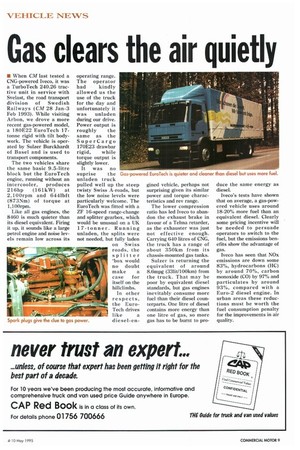Gas clears the air quietly
Page 11

If you've noticed an error in this article please click here to report it so we can fix it.
• When CM last tested a CNG-powered Iveco, it was a TurboTech 240.26 tractive unit in service with Svelast, the road transport division of Swedish Railways (CM 28 Jan-3 Feb 1993). While visiting Arbon, we drove a more recent gas-powered model, a 180E22 EuroTech 17tonne rigid with tilt bodywork. The vehicle is operated by Sulzer Burckhardt of Basel and is used to transport components.
The two vehicles share the same basic 9.5-litre block but the EuroTech engine, running without an intercooler, produces 216hp (161kW) at 2,100rpm and 6441bft (873Nm) of torque at 1,10Orpm.
Like all gas engines, the 8460 is much quieter than its diesel equivalent. Firing it up, it sounds like a large petrol engine and noise levels remain low across its operating range. The operator had kindly allowed us the use of the truck for the day and unfortunately it was unladen during our drive. Power output is roughly the same as the SuperCargo 170E23 drawbar rigid, while torque output is slightly lower.
It was no suprise the unladen truck pulled well up the steep twisty Swiss A-roads, but the low noise levels were particularly welcome. The EuroTech was fitted with a ZF 16-speed range-change and splitter gearbox, which would be unusual on a UK 17-tonner. Running unladen, the splits were not needed, but fully laden on Swiss roads, the splitter 'box would no doubt make a case for itself on the hillclimbs.
In other respects, the EuroTech drives like a diesel-en gined vehicle, perhaps not surprising given its similar power and torque characteristics and rev range.
The lower compression ratio has led Iveco to abandon the exhaust brake in favour of a Telma retarder, as the exhauster was just not effective enough. Carrying 640 litres of CNG, the truck has a range of about 350km from its chassis-mounted gas tanks.
Sulzer is returning the equivalent of around 8.6mpg (331it/100km) from the truck. That may be poor by equivalent diesel standards, but gas engines inevitably consume more fuel than their diesel counterparts. One litre of diesel contains more energy than one litre of gas, so more gas has to be burnt to pro duce the same energy as diesel.
Iveco's tests have shown that on average, a gas-powered vehicle uses around 18-20% more fuel than an equivalent diesel. Clearly some pricing incentive will be needed to persuade operators to switch to the fuel, but the emissions benefits show the advantage of gas.
Iveco has seen that NOx emissions are down some 83%, hydrocarbons (HC) by around 70%, carbon monoxide (CO) by 97% and particulates by around 93%, compared with a Euro-2 diesel engine. In urban areas these reductions must be worth the fuel consumption penalty for the improvements in air quality.
















































































































